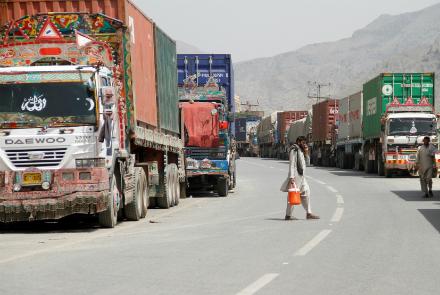The Pakistan-Afghanistan Joint Chamber of Commerce and Industries (PAJCCI) on Monday said that the closure of gates between the two nations has had a negative impact on Pakistan’s trade and economic reputation on the international platform.
According to PAJCCI, Pakistan’s decision to close trade access across the Durand Line has also resulted in major revenue losses for Pakistan.
But Pakistan’s Prime Minister Nawaz Sharif on Monday ordered the immediate re-opening of Torkham, Spin Boldak and other gates that were closed in the aftermath of recent “terrorist” attacks in the country, Pakistani media reported.
The crossing between the two countries remained closed for thirty days.
“We believe that the decision to close the border was not in the interests of either side including us and Pakistan,” said Afghan ambassador to Pakistan Hazarat Omar Zakhelwal.
PAJCCI states however that in the past month, millions of dollars was lost just in fresh fruit and vegetable wastage after the closure of gates prevented Pakistan from exporting through Afghanistan on to central Asia.
“Pakistan thought that by closing the border, it would create major problems for Afghanistan, but Afghanistan was not that badly affected as it is no longer so dependent on Pakistan,” said economic analyst Azarakhsh Hafizi.
According to the ministry of commerce and industry, Afghanistan suffered a 100 million dollar loss during this period. Up to 6,000 containers of Afghan goods are still however stuck on the Pakistani side of the Durand Line.
According to Afghan businessmen, Pakistan also charges $50 per day for each container.
Afghan businessmen warned they would break trade and commercial ties with Pakistan unless such problems are resolved.
In the past month, Afghan traders have brought in goods from Iran and central Asian countries.
“Now day’s products are coming from other countries and they replaced Pakistani products, so we don’t see any problem,” said a local seller in Kabul, Mohammad Saleh.


